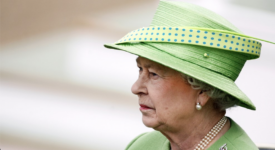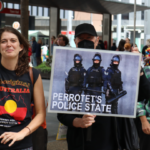“A Legacy of Deprivation”: The Death of Queen Elizabeth II

Right now, there are a lot of Australians mourning the death of Queen Elizabeth II. But, at the same time, a large portion of the nation is questioning the depth of significance her death has had upon our country, which is supposed to have severed its substantial ties with the royal family long ago.
The issues that have been raised by the responses to the death of the monarch, which has seen federal parliament close for fifteen days, include the extent of the power our ceremonial head of state actually wields, as well as whether the nation should continue on as a constitutional monarchy.
In terms of a republic, prime minister Anthony Albanese, who has this week been in the throes of Elizabethan adulation, has already pledged to hold a referendum on changing our head of state to a local if Labor is elected to government for a second term.
But the death of Elizabeth II has also provoked reflection upon the institution of the British Monarchy, which was the head of state during the time of empire.
At its peak in 1922, the British Empire had successfully invaded and taken control of a quarter of the planet’s landmass to rule over 458 million people.
In holding the throne for 70 years, Elizabeth was the longest “serving” British monarch. Yet, her reign was marked by a decline in empire, along with the decolonisation movement and a general reckoning around the colonisation and subjugation of other peoples for profit and plunder.
“The sun never sets”
“The enslavement of our ancestors has led to a legacy of deprivation, a legacy that still has to be sorted out,” former chair of the Barbados Reparations Task Force Pedro Welch told Democracy Now following the death of Queen Elizabeth.
Barbados removed the British monarchy as its head of state last November, and significantly, then Prince and now King Charlies III, attended the official ceremony marking the change, and, as he did so, he acknowledged his nation’s “appalling atrocity of slavery”.
Welch explained that the British Monarchy financed the beginning of its nation’s trade in African slaves, and it gained great financial benefit from the plantation system that was operating in those times throughout the Caribbean.
In terms of atrocities during Elizabeth II’s reign, most significantly, there was the 1950s British suppression of the Mau Mau revolution in the colony of Kenya, which saw the Windsors lording it over a system of concentration camps designed to break those calling for independence.
One and a half million Kikuyu people, who dominated the Mau Mau movement, otherwise known as the Kenyan Land and Freedom Army, were detained in the camp system and subjected to violence, torture and mass murder. The British then attempted a massive coverup of the operation.
“The bottom line is that serious crimes happened on the queen’s imperial watch,” historian Professor Caroline Elkins told Democracy Now. “In fact, her picture hung in every detention camp in Kenya as detainees were beaten in order to exact their loyalty to the British Crown.”
Severing ties
With the British Monarch as its head, the British Empire was responsible for the Irish famine, multiple famines in India, the mid-19th century Opium Wars on China, the Boer concentration camps in South Africa early last century, and the partitioning of India that led to up to 2 million deaths.
And in this part of the globe, a series of colonies were established under the British Monarch, which were later replaced with a constitutional monarchy. And all of this was achieved via the dispossession of and genocide upon First Nations people.
Indeed, for Aboriginal and Torres Strait Islander peoples the arrival of the British Crown marks the invasion of their lands, their subjugation to a foreign ruler and the imposition of an alien system of law, which all continues to this day.
The foundation of the Australian state was based on the Catholic Church’s Doctrine of Discovery, which posited that Europeans could take over lands that were empty or terra nullius, and Indigenous peoples weren’t an issue as they weren’t Christians, and therefore, were considered nonhuman.
Australia, as a nation, is currently trying to grapple with the crimes that were perpetrated upon First Peoples in its founding. And the current outpouring of grief for the Queen, serves an insult to these people, as she, as a figurehead, exemplifies their loss of Country.
The current multicultural nation of Australia bears little resemblance to the country in 1901. And the partial severing of ties with the British Monarchy that the act of federation involved now signifies our ongoing dependence upon the former coloniser.
And in terms of fears over offending the sensibilities of the British Monarch in severing ties, King Charles III has already signified his willingness to facilitate these final breaks with traditional spheres of influence, when he gave his personal blessing to Barbados last November.







